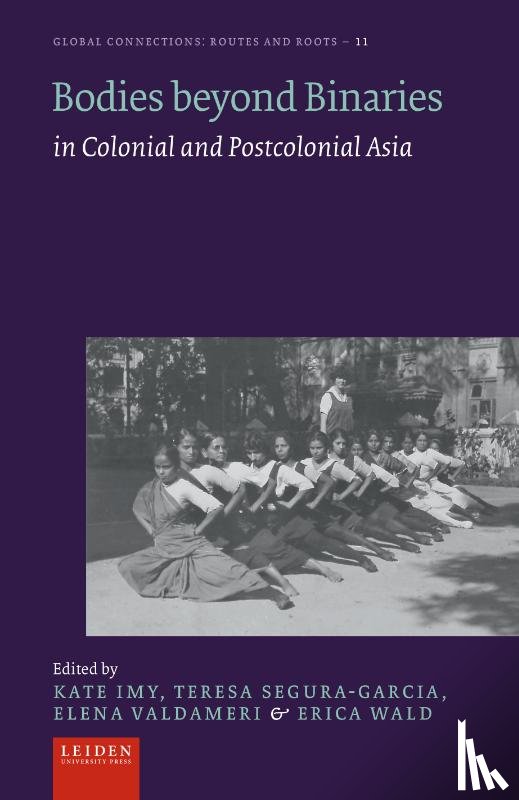Omschrijving
'Bodies beyond Binaries' advances the historiographical debate around the body in colonial and postcolonial Asia 'Bodies beyond Binaries' advances the historiographical debate around the body in colonial and postcolonial Asia. Opening new research avenues that go beyond the binaries that have sometimes permeated previous scholarly contributions, this book explores not just the direct colonial encounter, but also wider global interconnections and flows involved in the making of knowledge, cultural constructions, and ‘techniques’ of the body.
Throughout the volume, critical concepts such as gender, sexuality, race, class, caste, and religion intersect and dialogue with supposedly binary categories of corporeality such as ruled and unruly, emotional and trained, mobile and confined, and respectable and deviant. Problematised and transcended, these categories reveal their ambiguous and malleable nature.
Bringing together a range of contributions from established and emerging scholars working on different Asian regional and transregional foci, 'Bodies beyond Binaries' offers insights that are not simply relevant across Asia and within colonial settings, but also question Western-centric and culturally essentialist perspectives on the history of the body. 'Bodies beyond Binaries' advances the historiographical debate around the body in colonial and postcolonial Asia. Opening new research avenues that go beyond the binaries that have sometimes permeated previous scholarly contributions, this book explores not just the direct colonial encounter, but also wider global interconnections and flows involved in the making of knowledge, cultural constructions, and ‘techniques’ of the body.
Throughout the volume, critical concepts such as gender, sexuality, race, class, caste, and religion intersect and dialogue with supposedly binary categories of corporeality such as ruled and unruly, emotional and trained, mobile and confined, and respectable and deviant. Problematised and transcended, these categories reveal their ambiguous and malleable nature.
Bringing together a range of contributions from established and emerging scholars working on different Asian regional and transregional foci, 'Bodies beyond Binaries' offers insights that are not simply relevant across Asia and within colonial settings, but also question Western-centric and culturally essentialist perspectives on the history of the body. Table of Contents
Unframing the Binary: Introducing Bodies Beyond Binaries - Kate Imy, Teresa Segura-Garcia, Elena Valdameri and Erica Wald
Part 1: Ruled and Unruly
Chapter 1. Trans without Borders: Castration and the Politics of Historical Knowledge - Howard Chiang
Chapter 2. Embodiment and Biomedical Authority in South Asia: Reading Objectification and Subversion in the Colonial Clinic - Samiksha Sehrawat
Chapter 3. The Body of the Burmese Muslim - Chie Ikeya
Part 2: Emotional and Trained
Chapter 4. Bodies, Emotions, Labour. The Jamia Millia Islamia and the New Education Movement - Margrit Pernau
Chapter 5. A Healthy Body for a Healthy Mind? The Corporal Impact of Student Mobility from and Towards Indochina, 1900-1945 - Sara Legrandjacques
Chapter 6. Wrestling for the Humankind of the Future: Aurobindo Ghose’s and Mirra Alfassa’s Politics of Physical Education in Pondicherry - Julia Hauser
Part 3: Mobility and Confinement
Chapter 7. Masculinity on the Move from Barcelona to Bombay: The Men of the Catalan Bourgeoisie and their Bodily Encounters in Colonial India - Teresa Segura-Garcia
Chapter 8. Purdah, National Degeneration, and Pelvic Politics: Women’s Physical Exercise in Colonial India, c. 1900–1947 - Elena Valdameri
Chapter 9. Captive Bodies: Soldier and Civilian Internment in the Japanese Occupation of Malaya and Singapore, 1942-1945 - Kate Imy
Part 4: Respectability and Deviancy
Chapter 10. Pigsticking: the ‘Noble’ Indian Boar and Colonial Constructions of Elite Masculinity - Erica Wald
Chapter 11. The Many Lives of the European ‘vagrant’ in colonial Singapore, c. 1890-1940 - Zhi Qing Denise Lim
Chapter 12. Exhibiting Civilization. The Comité Revolucionario Filipino and the Portraits of Filipino Bodies and Minds, 1898-1899 - Laura Diaz-Esteve
Afterword - Willemijn Ruberg
Bibliography
About the Authors
Index


